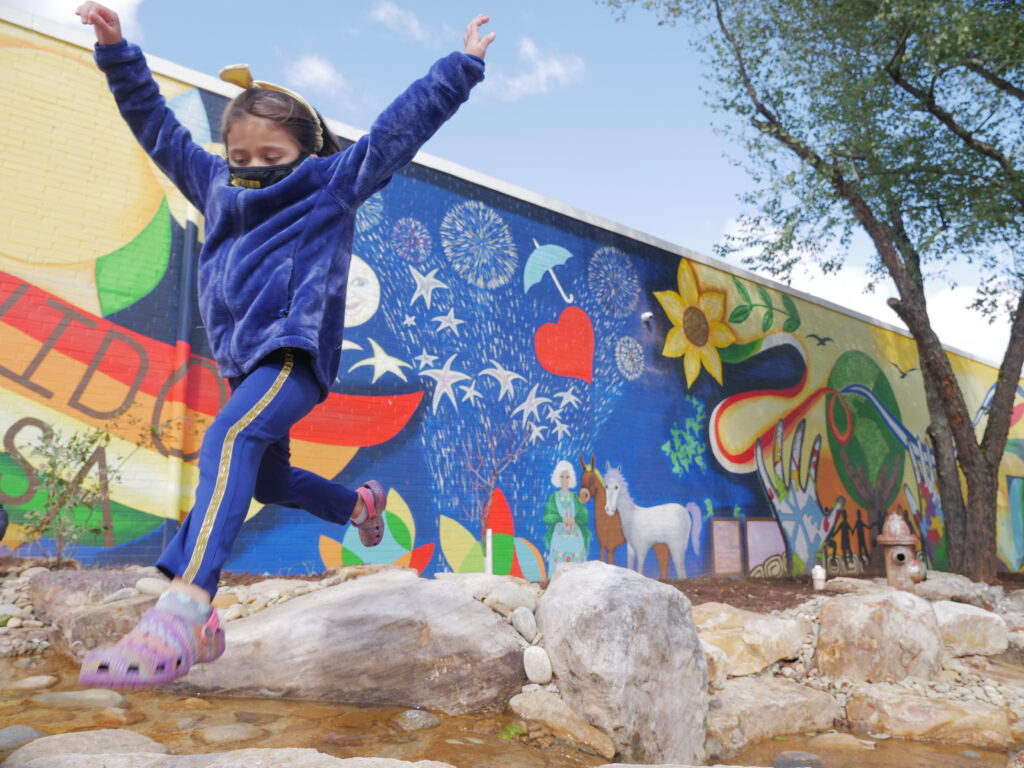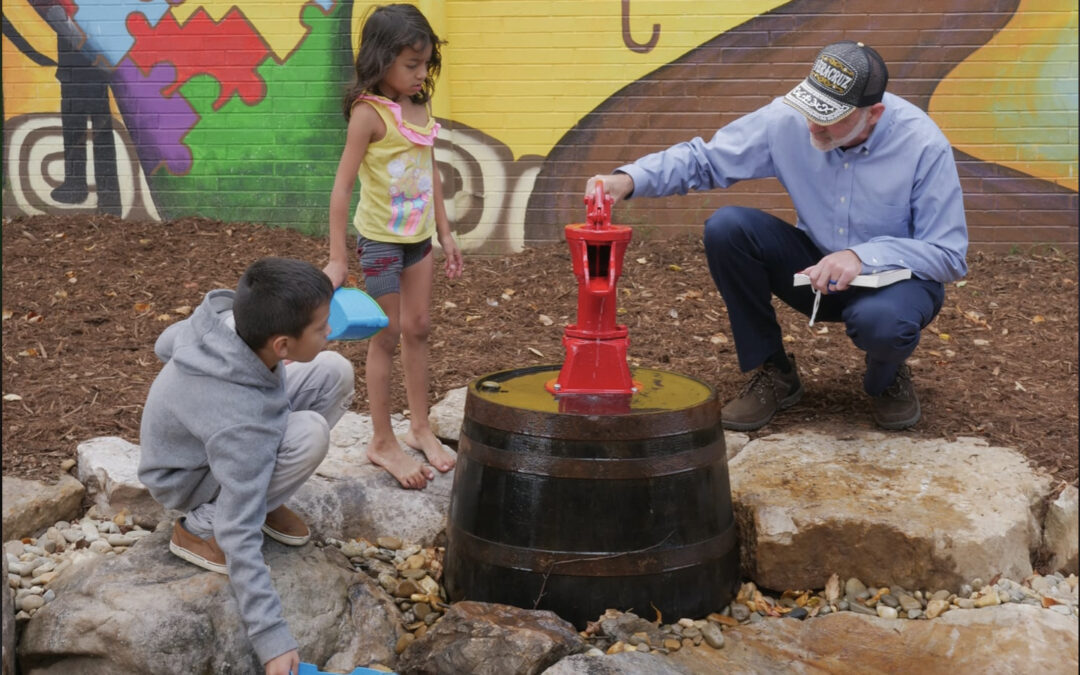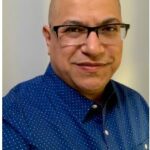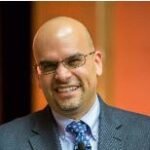 Luke Smith could be sitting in a nice office someplace charging a couple hundred dollars an hour as a child psychiatrist. That’s not who he is, though. He’s more of the roll-up-your-sleeves and get-involved type.
Luke Smith could be sitting in a nice office someplace charging a couple hundred dollars an hour as a child psychiatrist. That’s not who he is, though. He’s more of the roll-up-your-sleeves and get-involved type.
Smith is the director of El Futuro, a nonprofit clinic in Durham where Spanish-speaking immigrants can access culturally responsive mental health services. He’s been working with the immigrant community for 20 years, and you can hear some of his “why” when he talks about early experiences.
Like the time the Department of Social Services brought a student into his clinic after suspected child abuse. The DSS representative said the child had told his friends at school his parents were molesting him.
“But the word for ‘to bother’ in Spanish is molestar,” Smith said. “His parents were bothering him. They weren’t abusing him at all.”
Or another experience, when Smith attended an Individualized Education Plan (IEP) meeting on behalf of a Latino family. He remembers the red carpet treatment he received as a doctor, and the very different treatment offered to his patient-family.
There was an element of classism, and it wasn’t limited to the English speakers in the room.
“The translator — yeah, they got the job because they speak Spanish, but they’re not really connected with this family,” Smith said. “He was looking down at this family.”
These early experiences helped Smith see the barriers between Spanish-speaking families and the schools. He realized that the challenges to offering mental health services were not just language-based, but were cultural, too.
“It’s not clear-cut; it’s a little more messy than that,” he said. “And not everybody is willing to get messy.”
But Smith rolled up his sleeves and helped create a place where members of the Latino community — adults and youths — feel comfortable going for mental health services.
El Futuro, which was founded as a volunteer organization in 2001, formed as a nonprofit in 2004 and now has a staff of 43 — including 25 clinicians.
Today, it serves the mental health needs of Latino families in Durham and Siler City — “in a bilingual environment of healing and hope.” And it does so with nearly 75% of funding coming from grants and donations.
Here’s how it works.
Confianza — developing deep trust first, then meeting mental health needs
The first ingredient is trust. But not just any trust — confianza.
“It’s a deep trust,” Smith said. “When an immigrant comes into our community, it’s what they’re looking for and hold onto very quickly. So many of us have that experience of going to another country and finding somebody you can talk to, and you feel like, oh, this is my best friend all of a sudden. I don’t think we always reciprocate that very well as Americans when people come to the U.S. But when we do, we make friends for life.”
Smith talked about a stigma in the Latino community regarding mental health. Based on his work, he said, he realizes that setting up a clinic and offering mental health services is not enough to guarantee El Futuro can serve the community.
Instead of hanging a sign and hoping Spanish-speaking residents will come to it, El Futuro tries to meet the community where they are.
People come for services, but what they find is relationship. And through building relationships, El Futuro has grown more effective.
“We’ve never once had to really advertise our services because people, through those key concepts of confianza and relationships, people found us. We’ve never once had to go out looking for people.”
Calor humano — a focus on compassion
As the organization has grown, it has maintained its personality and focus on calor humano — human warmth.
El Futuro serves nearly 1,800 people a year, about 45% of whom are youths. Most of El Futuro’s clients have experienced trauma related to poverty and migration.
Nearly all, about 98% live below the poverty level and 56% have been victims of crime.
“Making mental health treatments accessible for underserved Latino families,” Smith says, “improves their quality of life and helps people get back to their dreams for the future that brought them to our community in the first place. It creates a better, healthier community for all.”
The mental health services are a priority, but when families come they aren’t just getting prescriptions or therapies. They’re building connection.
Check out the whole article here (article by Rupen Fofaria)
This article is a great example of our work and how passionate we are about seeing our community fulfill its dreams. Therefore, today, this end of the year, consider making your contribution to Latino families facing situations such as depression, anxiety, stress, or children and youth with ADHD and help their parents better understand this condition. If you want to make your donation, click on the button below.


 Alvely Alcántara, LCSW
Alvely Alcántara, LCSW Rossy C. Garcia, MEd
Rossy C. Garcia, MEd  Katy Sims, MD
Katy Sims, MD  Everardo Aviles, LCSW, LCAS (Eve)
Everardo Aviles, LCSW, LCAS (Eve) As a medical anthropologist and social work researcher, Dr. Gulbas’ research embodies interdisciplinarity through the integration of applied theories of health and human development with qualitative and ethnographic methodologies. Her work seeks to understand how people—children, families, and providers—navigate complex sociocultural landscapes in the pursuit of mental health. Most of her work, to date, focuses attention on developing more robust interpretations of suicide risk. With funding from the National Institutes of Mental Health, this body of research has contributed to advancements in theoretical and empirical knowledge of the broader contexts within which youth suicide risk is situated.
As a medical anthropologist and social work researcher, Dr. Gulbas’ research embodies interdisciplinarity through the integration of applied theories of health and human development with qualitative and ethnographic methodologies. Her work seeks to understand how people—children, families, and providers—navigate complex sociocultural landscapes in the pursuit of mental health. Most of her work, to date, focuses attention on developing more robust interpretations of suicide risk. With funding from the National Institutes of Mental Health, this body of research has contributed to advancements in theoretical and empirical knowledge of the broader contexts within which youth suicide risk is situated.  R. Gabriela Barajas-Gonzalez is a developmental psychologist and an assistant professor of Population Health at NYU Grossman School of Medicine. Dr. Barajas-Gonzalez is the principal investigator of a study that examines the impact of immigration-related threat and stress on school communities. She earned a PhD in developmental psychology from Columbia University and hold a BA in human biology from Stanford University. Dr. Barajas-Gonzalez is the daughter of Mexican immigrants and a first gen college student.
R. Gabriela Barajas-Gonzalez is a developmental psychologist and an assistant professor of Population Health at NYU Grossman School of Medicine. Dr. Barajas-Gonzalez is the principal investigator of a study that examines the impact of immigration-related threat and stress on school communities. She earned a PhD in developmental psychology from Columbia University and hold a BA in human biology from Stanford University. Dr. Barajas-Gonzalez is the daughter of Mexican immigrants and a first gen college student. Dr. Parra-Cardona is an Associate Professor in the Steve Hicks School of Social Work (SHSSW) at the University of Texas at Austin. At the SHSSW, he serves as Coordinator for Mexico and Latin American initiatives. He also serves as Area Director for Research at the UT Austin Latino Research Institute. Dr. Parra-Cardona’s program of research is focused on the cultural adaptation of evidence-based parenting interventions for low-income Latinx populations in the US and Latin America.
Dr. Parra-Cardona is an Associate Professor in the Steve Hicks School of Social Work (SHSSW) at the University of Texas at Austin. At the SHSSW, he serves as Coordinator for Mexico and Latin American initiatives. He also serves as Area Director for Research at the UT Austin Latino Research Institute. Dr. Parra-Cardona’s program of research is focused on the cultural adaptation of evidence-based parenting interventions for low-income Latinx populations in the US and Latin America. Bianka Reese, PhD, MSPH is a research scientist and program evaluator specializing in adolescent and young adult sexual and reproductive health. Her previous research in the experiences of Latinx LGBTQ+ youth stems from her work as the Research and Evaluation Manager at SHIFT NC (Sexual Initiatives For Teens), where she led largescale evaluations of multilevel, community-based sexual health promotion initiatives and research projects aimed at elevating the voices of diverse youth in North Carolina. Dr. Reese is currently the Senior Research Strategist at Creative Research Solutions, LLC, an award-winning national evaluation, research, and assessment firm.
Bianka Reese, PhD, MSPH is a research scientist and program evaluator specializing in adolescent and young adult sexual and reproductive health. Her previous research in the experiences of Latinx LGBTQ+ youth stems from her work as the Research and Evaluation Manager at SHIFT NC (Sexual Initiatives For Teens), where she led largescale evaluations of multilevel, community-based sexual health promotion initiatives and research projects aimed at elevating the voices of diverse youth in North Carolina. Dr. Reese is currently the Senior Research Strategist at Creative Research Solutions, LLC, an award-winning national evaluation, research, and assessment firm. Tania Connaughton-Espino, MPH is an independent researcher focused on adolescent and young adult sexual and reproductive health. Her interest in the experiences of Latinx LGBTQ+ youth stems from her previous work with SHIFT NC (Sexual Initiatives For Teens), where she led the training and evaluation department, conducted capacity-building workshops for youth serving professionals including on the topic of how to be more affirming of LGBTQ youth, and from her extensive experience working with the Latinx population in NC.
Tania Connaughton-Espino, MPH is an independent researcher focused on adolescent and young adult sexual and reproductive health. Her interest in the experiences of Latinx LGBTQ+ youth stems from her previous work with SHIFT NC (Sexual Initiatives For Teens), where she led the training and evaluation department, conducted capacity-building workshops for youth serving professionals including on the topic of how to be more affirming of LGBTQ youth, and from her extensive experience working with the Latinx population in NC. Maru Gonzalez, EdD is an Assistant Professor and Youth Development Specialist in the Department of Agricultural and Human Sciences at North Carolina State University. Her areas of inquiry include youth development with a focus on activism, social justice, and the experiences of LGBTQ+ young people across familial, school, and community contexts.
Maru Gonzalez, EdD is an Assistant Professor and Youth Development Specialist in the Department of Agricultural and Human Sciences at North Carolina State University. Her areas of inquiry include youth development with a focus on activism, social justice, and the experiences of LGBTQ+ young people across familial, school, and community contexts.  Nayeli Y. Chavez-Dueñas, PhD
Nayeli Y. Chavez-Dueñas, PhD Hector Y. Adames, PsyD
Hector Y. Adames, PsyD